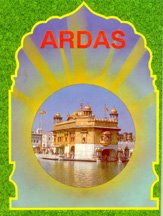
Below are Bhenji Seleena Kaur's questions (which I am grateful she asked), with my answers below:
I was just re-checking the simran booklet we've made [for Sikh Society] and there is a bit of the translation that I would like to double check with you...I have my thoughts in the text as capitals...The Divine Creative Being has been attributed with countless Names, for example, ‘Allah’, ‘Raam’, ‘Kudaah’, ‘Guru’, ‘Satguru’, ‘Gobind’, ‘Raam,’ ‘Nirunkaar’, ‘Gopal’etc and so on. However Gurbaani clearly states that the Creator Being has no name and is beyond our description.
from the ardaas:
sree Bhagautee jee sahaaé
May the respected sword (God in the form of the Destroyer of evil doers) help us!
vaar sree Bhagautee jee kee paatshaahee dasvee
Ode of the respected sword recited by the Tenth Guru.
WHAT DOESTHIS MEAN...HOW CAN U RECITE A SWORD?
ਨਵਤਨ ਨਾਮ ਜਪੈ ਦਿਨੁ ਰਾਤੀ ਇਕੁ ਗੁਣੁ ਨਾਹੀ ਪ੍ਰਭ ਕਹਿ ਸੰਗਾ ॥੧੬॥
navtan naam japai din raatee, ik gun naahee prabh kahi sangaa. ||16||
One may chant new names for You day and night, but even so, O God, no one can describe even one of Your Glorious Virtues. ||16|| (Ang 1083)
Sri Guru Gobind Singh Ji, the Tenth Nanak, says in Jaap Sahib:
ਤਵ ਸਰਬ ਨਾਮ ਕਥੈ ਕਵਨ ਕਰਮ ਨਾਮ ਬਰਨਤ ਸੁਮਤਿ ॥1॥
tav sarab naam kathe kavan, karam naam barnat sumat.1.
“No one can tell all the Names of the Lord, who is called by special Name by the wise, according to His excellences and doings. ||1||”” (P. 2, Dasam Granth)
Therefore, there is no name for Vaheguru, but instead we use Vaheguru’s actions and virtues to address him and praise Him. In the case of Bhagauti, which literally means sword, it is as an adverb (describing doing word) to explain God's attributes. For example, both Vaheguru and the Kirpan share the qualities of being powerful, destroying of tyrants and negativity, delivering justice and protecting the saints and the weak. Therefore the Sword (Bhagauti) is used as an expression of addressing God.
teg bahaadar simreeai, kar nau niDh aavai DhaaYou can read the reply to this question in an article on Panthic Weekly here.
Remember and meditate upon Guru Tegh Bahadar; and the nine sources of wealth will come hastening to your home.
WHAT ARE THE NINE SOURCES OF WEALTH?...
"Chaunkeeaa(n)" means posts. Large historical Gurdwaras would have these watch posts around the Gurdwara to protect the Gurdwara Sahib from attacks.
sikhaa(n) noo sikhee daan, kes daan, rehat daan, bibek daan, bharosa daan, naam daan, sree amritsar jee dé ishnaan, chaunkeeaa(n), jhanddé, bungé, jugo jug attal, dharam kaa jaikaar, bolo jee waaheguroo!
Kindly confer upon the Sikhs the gift of Sikhi (Sikhism), the gift of unshorn hair, the gift of observing Sikh discipline, the gift of wisdom, the gift of firm faith, the gift of belief and the biggest of Naam and of bathing in the respected Tank (sarowar) of Amritsar. O Lord! May the choirs, the mansions and the banners exist forever; may the truth every triumpth; utter Waaheguroo (Wonderous Lord)!
WHAT "MANSIONS, GURDWARAS, AND BANNERS" IS IT TALKING ABOUT?
"Bungé" means house or settlement. Again, many large historical Gurdwara, especially the the Panj Takhat have houses or settlements were certain regiments or jathas would camp out.
After 1947 India was partitioned into Pakistan. During this partition, Sikhs were separated from many of Sikh shrines and historical Gurdwaras in Pakistan. In particular Sri Nankana Sahib. So we do Ardaas that may we be continously be able to visit these Gurdwaras freely, without restriction and that we may be able manage them and maintain Gurmat Rehat in these Gurdwaras.
Hé Akaal Purakh, Apné Panth Dé Sadaa Sahaaee Daataar Jeeo, Sree Nankaanaa Saahib té Hor Gurduaariaa, Jinaa To Panth Nu Vichoriaa Ge-aa Hai, Khulé Darshan Didaar Té Sevaa Sambaal Daa Daan Khaalsa Ji Noo Baksho.
O Immortal Lord! The constant Helper of His Sikhs, kindly confer the gift of visiting, maintaining, controlling and worshipping,without any restrictions, the Gurdwara of Nanakana Sahib Ji, other Gurdwaras, and Gurus Mansions of which the Khalsa has been deprived.
WHAT DEPRIVATION IS THIS REFERRING TO? GURDWARAS THAT SIKHS DO NOT CONTROL? WHICH ONES?
The ardaas is not just for those Gurdwaras in Pakistan, however it's an ardaas (prayer) that may all Gurdwaras worldwide be managed and controlled by the KHALSA. Is this already the case? Unfortuntaly no! Many Gurdwaras are being run by people who are not Amritdhari and nor do they aim to take Amrit and commit themselves to the Guru. They commit the four taboos (which includes cutting the hair, taking intoxicants like alcohol etc...) and yet manage the House of Guru Nanak. You can read more about this issue on an article published by Bhai Gurmukh Singh on Panthic Weekly
Raaj Karegaa Khaalsa, Aakee R'he Naa Koé.
K'vaar Hoé Sabh Milengé, Baché Sharan Jo Hoé.
The Sikh people shall remain free and sovereign, always, non-challenging this position. For, all shall realise, after bitter frustration, that there is no liberation except in the way of the life that the Khalsa upholds!
HOW CAN SIKHS SIMULTAENOUSLY BELIEVE IN RESPECT FOR ALL FAITHS AND THAT ONLY SIKHS ARE LIBERATED?... DOESN'T THIS INDIRECTLY IMPLY THAT SIKHS BELIEVE THAT THE SIKH WAY IS THE ONLY WAY?... THAT SUGGESTS THAT SIKHI IS SUPERIOR TO OTHER FAITHS AND IS ANOTHER FORM OF CASTE SYSTEM AND DIVISION.
Note: The first part of Dohiraa (the couplet sang at the end of Ardaas) is a Rehatnaama of Bhai Prahlaad Singh jee, who records the spoken order of Guru Gobind Singh jee. Second part of the Dohira (as shown above) is Guru Gobind Singh jee's spoken words recorded in Bhai Nand Lal Singh jee's Tankhahnaama.
Sri Guru Granth Sahib jee talks about the Khalsa as:
ਕਹੁ ਕਬੀਰ ਜਨ ਭਏ ਖਾਲਸੇ ਪ੍ਰੇਮ ਭਗਤਿ ਜਿਹ ਜਾਨੀ ॥੪॥੩॥
kaho kabeer jan bhe-e khaalse, prem bhagat jeh jaanee. ||4||3||
Says Kabeer, those humble people become pure - they become Khalsa - who know the Lord's loving devotional worship. ||4||3||
(Ang 655)
What does the Khalsa stand for and represent? The answer is: Truth; Justice; Courage; Sewa (selfless service); Saint-Warrior; Respect; Honour; Living in Grace & Glory of God; Seeing God in all; Respecting all people and creation; Defending the Weak; Living Dharam; Not polluting the body and causing unnecessary harm to others etc.
It is ONLY through the LIFESTYLE OF THE KHALSA that the world can be liberated. NO ONE can find liberation through ANY OTHER WAY!
The Khalsa projects these values, these principles and these virtues in a PHYSICAL FORM through their Rehat (disciplined way of life) and 5Ks. For example the Kirpaan (sword) is a physical projection of Truth & Justice, the Kesh (unshorn hair) covered with a Dastaar (turban) is a physical projection of the belief of living in the Grace & Glory of God, and the Kachhera (Sikh undergarment0 is an outer projection of the value of living a high moral character etc. So it is ONLY through the KHALSA'S WAY OF LIFE and PRINCIPLES that a person can be liberated.
Look at the Human Rights declaration, a work of the 20th century is something which Guru Tegh Bahadar (the Ninth Nanak) practiced in reality by giving his head for the freedom of human rights and freedom of religious expression. (Amnesty International recognise Guru Tegh Bahadar as the first Human Rights Activist who sacrificed his life for the freedom of others). Now the world is waking up to the principles and message of Guru Nanak Ji (whether they realise it or not). TRUTH IS UNIVERSAL. Sikhs do not have a monopoloy on Truth. Our Guru's simply showed us a simple way of living and a SHORT CUT to EXPERIENCING GOD and EXPERIENCING a LIFE OF BLISS (happiness).
Rab Bhalla Kare! One day there will a smoking ban in Western countries for sure and eventually the world. The same goes for alcohol and intoxicants though it may take a few more centuries.

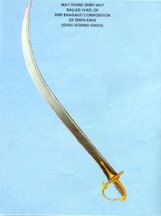
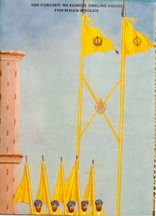
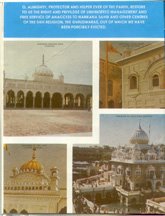

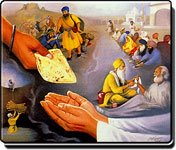
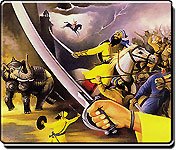

Paji
ReplyDeleteWho composed the ardaas?
The Ardaas from the start upto "Teg Bahadar Simreeai Ghar Nau Nidha Avai Dhaae. Sabh Thaaee Hoye Sahaaye" is written by Guru Gobind Singh jee recorded in Chandi di Vaar.
ReplyDeleteThe rest of the Ardaas was created by the Sikh Sangat after Guru Gobind Singh jee left his physical body and left guruship to Guru Granth Sahib jee & Guru Khalsa Panth. In particular the part mentioning Guru Gobind Singh jee and Guru Granth Sahib jee was added by early Sangat after the departure of Guru Gobind Singh jee's physical body.
I am sure the Ardaas on top of that existed in various forms and evolved with time.
During the atack on Harmandar Sahib by Ahmed Shah Abadli the Sikhs decided to evacuate Amritsar and take refuge in the jungles. It was a battle where they could not keep hold of Darbar Sahib. However, one brave Singh called Baba Gurbaksh Singh said that he willing to die and put up a fight and marry death in the honour of putting up a fight for the Guru's House.
Baba jee did an ardaas for the Khalsa, remembering the Panj Piaare, Chaar Sahibzaadey etc and the Shaheed Singhs and SinghNeeaa and asked for "Sikhi Daan, Kes Daan..." etc. This ardaas was used by many Sikhs. Because it captured INSPIRATION.
The Ardaas was FORMALISED by Sri Akaal Takhat Sahib in the mid 1940s during the making of Sikh Rehat Maryada by Panthic Scholars and representative of the Guru Khalsa.
The Ardaas was modified after partition to include about Nankana Sahib.
The Ardaas is kept General so that it encaptures and incorperates all the great people of Sikh history from whom we seek strength and inspiration when we remember them. However, it possible the Ardaas will evolve in the future under the guidance of Sri Akal Takhat Sahib.
Hope that helps.